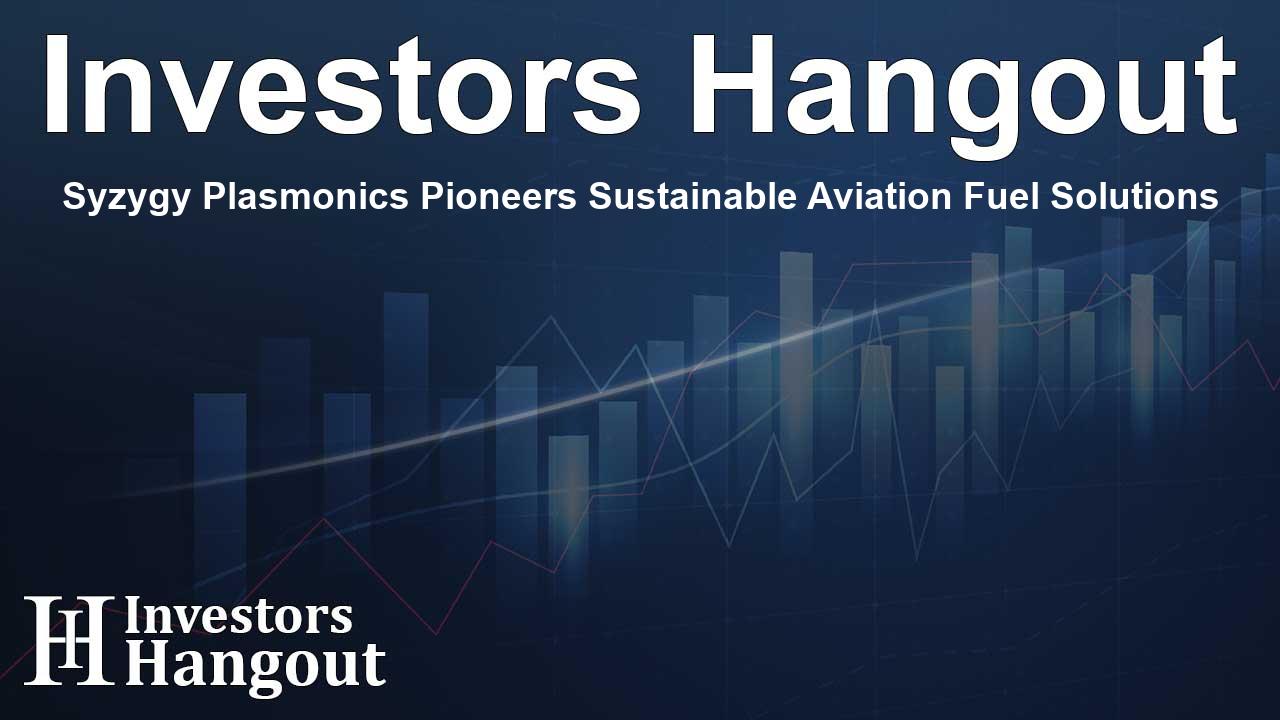Syzygy Plasmonics Pioneers Sustainable Aviation Fuel Solutions

Transforming the Future of Aviation Fuel
As aviation leaders across Europe call for immediate action to meet net-zero targets, Syzygy Plasmonics is poised to lead the way with groundbreaking solutions. The company's publication of its NovaSAF Pricing Framework showcases how its innovative processes can fulfill stringent sustainability regulations while providing airlines with competitive pricing options.
NovaSAF Framework: A Game Changer
With its white paper unveiled, Syzygy's approach to converting biogas into both renewable fuels of non-biological origin (RFNBO) and Sustainable Aviation Fuel (SAF) stands as a significant milestone. Independent assessments confirm that the NovaSAF1 facility is on track to receive dual ISCC EU certification for both advanced biofuels and RFNBO, leveraging manure-based biogas alongside renewable electricity.
CEO Insights
Trevor Best, the CEO of Syzygy Plasmonics, emphasizes the urgency of implementing sustainable aviation fuel. He states, "We're proving that SAF can meet the toughest sustainability standards while reaching cost levels that make sense for airlines. Our goal is to make sustainable flight the new standard, not the exception." This sentiment reflects a growing commitment to environmental stewardship within the aviation sector.
Addressing the Challenges of SAF Supply
Syzygy Plasmonics recognizes the ongoing challenge airlines face in accessing enough SAF to meet both EU mandates and CORSIA requirements. Current SAF options have often been either too costly or too scarce, leading to a supply gap that needs bridging. Syzygy's innovative strategy offers a promising solution by integrating low-cost biogenic feedstocks with renewable energy sources.
Strategic Production Model
The company’s hub-and-spoke production model is central to this initiative. Modular units convert biogas into Fischer-Tropsch crude, which is then transformed into SAF at centralized facilities. This model aims to become both economically feasible and scalable, with an operating scale that begins at around 100,000 tons per year—small enough to implement while still making a significant impact on the market.
Competitive Pricing Strategy
Through its comprehensive pricing strategy, NovaSAF's costs are designed to exceed current bioSAF pricing under various conditions. For instance, even with elevated feedstock costs—like $25 per MMBtu for biogas or $0.15 per kWh for renewable power—Syzygy positions itself competitively. In Europe, pricing for advanced biofuels could trail at approximately $1,800 per ton and $3,000 per ton for e-SAF, making it increasingly viable.
Market Readiness
Syzygy Plasmonics is reaching out to the aviation industry, initiating structured offtake discussions to secure commitments as mandates and ESG timelines come into effect. According to Best, 'This is the moment to secure your future fuel supply.' Airlines that engage early with Syzygy can ensure access to scalable and compliant volumes of SAF, creating not just regulatory harmony but a tangible route towards achieving net-zero targets.
About Syzygy Plasmonics
Syzygy Plasmonics is dedicated to enhancing the shift towards low-carbon aviation through innovative technologies and sustainable practices. Their commitment centers around transparency and effective lifecycle greenhouse gas reductions.
Frequently Asked Questions
What is Syzygy Plasmonics focused on in the aviation sector?
Syzygy Plasmonics is dedicated to creating sustainable aviation fuel solutions that align with environmental standards and cost-effectiveness.
What does the NovaSAF Pricing Framework provide?
The NovaSAF Framework validates that biogas can be transformed into RFNBO and Bio SAF while meeting stringent EU sustainability criteria.
How does Syzygy's production model work?
They employ a hub-and-spoke model where local production units convert biogas into Fischer-Tropsch crude, which is refined into SAF at central hubs.
What are the anticipated benefits of NovaSAF?
NovaSAF aims to deliver SAF at competitive prices, making it accessible for airlines while adhering to sustainability mandates.
What is the future outlook for sustainable aviation fuel?
Sustainable aviation fuel is becoming increasingly essential for meeting both regulatory requirements and corporate sustainability goals in the aviation industry.
About The Author
Contact Thomas Cooper privately here. Or send an email with ATTN: Thomas Cooper as the subject to contact@investorshangout.com.
About Investors Hangout
Investors Hangout is a leading online stock forum for financial discussion and learning, offering a wide range of free tools and resources. It draws in traders of all levels, who exchange market knowledge, investigate trading tactics, and keep an eye on industry developments in real time. Featuring financial articles, stock message boards, quotes, charts, company profiles, and live news updates. Through cooperative learning and a wealth of informational resources, it helps users from novices creating their first portfolios to experts honing their techniques. Join Investors Hangout today: https://investorshangout.com/
The content of this article is based on factual, publicly available information and does not represent legal, financial, or investment advice. Investors Hangout does not offer financial advice, and the author is not a licensed financial advisor. Consult a qualified advisor before making any financial or investment decisions based on this article. This article should not be considered advice to purchase, sell, or hold any securities or other investments. If any of the material provided here is inaccurate, please contact us for corrections.
